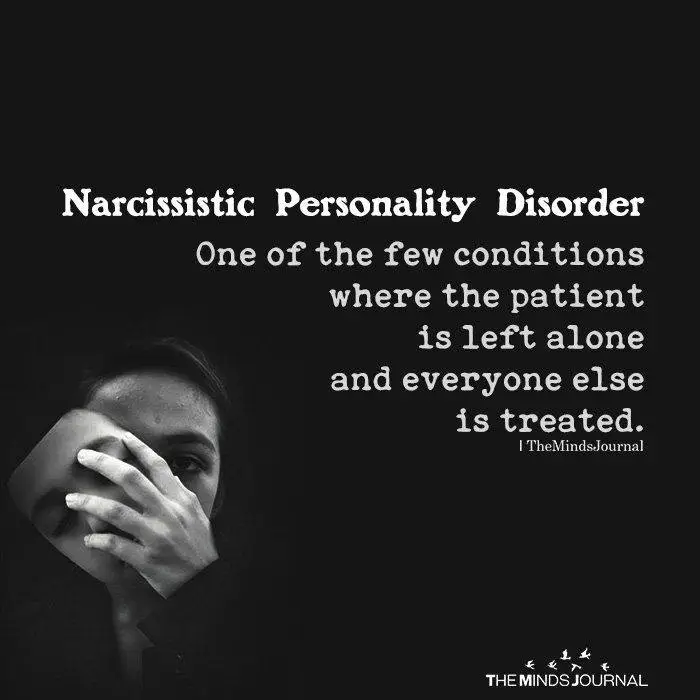Have you always been treated horribly by narcissists, but you never knew how to counter that? The best way is to understand the mind of a narcissist. Knowing how a narcissist thinks can help you understand how they function.
We often hear the term “narcissist,” but in reality, what does that mean? Does it merely describe someone who likes to be the center of attention, or likes the way he or she looks? Or is there more to it?
The psychiatric literature defines narcissists as possessing specific traits, such as having a sense of entitlement or requiring excessive admiration. But what are narcissistic individuals really like on a day-to-day basis?
Related: What Goes On Inside The Mind Of A Narcissist: What Is Narcissism?
Inside The Mind Of A Narcissist
Anyone who has lived with or worked for a narcissist will tell you: Narcissists view themselves entirely differently — i.e., preferentially — compared to others, making those around them less valued.
And there’s the rub: Everything must be about the narcissist. We don’t mind that a 2-year-old needs constant attention. That’s appropriate for the developmental stage of a 2-year-old. But we do mind when a 40-year–old needs that level of appreciation — and when achieving it comes at our expense.
Narcissists victimize those around them just by just being who they are, and they won’t change. That statement may seem extreme until you listen to the stories of those who have been victimized by a narcissist. Then you realize just how toxic relationships with these individuals can be.
Work for a narcissistic boss, and he or she can make you physically or psychologically ill. Live with one, and it could be worse. In researching my book, Dangerous Personalities, I talked to scores of individuals who have been victimized by the narcissistic personality.
Listening to story after story of stolen childhoods, destructive marriages, and burdensome relationships, I heard the same refrain: Narcissists see themselves as being so special that no one else matters. No one. Over time, the behavior resulting from their defining pathological traits will cast a wide debris field of suffering.
I have learned from the victim’s lessons that no medical book can teach, and they are lessons for all of us.

How Narcissists See Themselves
1. I love myself, and I know you do, too. In fact, everyone does. I can’t imagine anyone who doesn’t.
2. I have no need to apologize. You, however, must understand, accept, and tolerate me no matter what I do or say.
3. I have few equals in this world, and so far, I have yet to meet one. I am the best _______ (manager, businessman, lover, student, etc.).
4. Most people don’t measure up. Without me to lead, others would flounder.
5. I appreciate that there are rules and obligations, but those apply mostly to you because I don’t have the time or the inclination to abide by them. Besides, rules are for the average person, and I am far above average.
Related: Mind Of A Narcissist: 7 Signs of A Female Narcissist
6. I hope you appreciate all that I am and everything that I have achieved for you — because I am wonderful and faultless.
7. I do wish we could be equals, but we are not and never will be. I will remind you with an unapologetic frequency that I am the smartest person in the room and how well I did in school, in business, as a Parent, etc. — and you must be grateful.
8. I may seem arrogant and haughty, and that’s OK with me; I just don’t want to be seen as being like you.
9. I expect you to be loyal to me at all times, no matter what I do. However, don’t expect me to be loyal to you in any way.
10. I will criticize you and expect you to accept it, but if you criticize me, especially in public, I will come at you with rage. One more thing: I will never forget or forgive, and I will pay you back one way or another — I am a “wound collector.”
11. I expect you to be interested in what I have achieved and what I have to say. I, on the other hand, am not at all interested in you or what you have achieved, so don’t expect much curiosity or interest from me about your life. I just don’t care.
12. I am not manipulative; I just like to have things done my way, no matter how much it inconveniences others, or how it makes them feel. I don’t care how others feel — feelings are for the weak.
13. I expect gratitude at all times, for even the smallest things I do. As for you, I expect you to do as I ask.
14. I only associate with the best people, and frankly, most of your friends don’t measure up.
15. If you would just do what I say, things would be better.
As you can imagine, it is not easy living with or working with someone who thinks or behaves this way.
The experience of those who have done so teaches us the following (and if you remember nothing else from this post, remember this): Narcissists overvalue themselves and devalue others, and that means you. You will never be treated as an equal, you will never be respected, and you will in time be devalued out of necessity so that they can overvalue themselves.
Related: Inside The Mind Of A Narcissist:How Do Narcissists Think And Work?
Tolerating the Narcissistic Personality
Knowing the traits of the narcissistic personality and how narcissists view themselves is useful, but so is knowing what can happen when you associate with them. Some, like children, close relatives, or the elderly, may not have a choice. In those cases, it is up to friends, relatives, teachers, coaches, associates, and co-workers to support them as best we can.
And there are those who choose to stick it out, because of finances, circumstances, or because they are in a complicated relationship or marriage. To them I say, beware: You will pay a price. I say this from experience and from talking to many victims.
Those who choose to live with or work with a narcissistic personality must be prepared to accept the following:
1. Accept that you are not equals because narcissists feel that they have no equals.
2. Those feelings of insecurity, dismay, disbelief, or incongruity you are experiencing are real and will continue.
3. Because narcissists overvalue themselves, you will be devalued. Gird yourself to be repeatedly degraded.
4. You will be talked to and treated in ways you never imagined, and be expected to tolerate it.
5. The narcissist’s needs, wants, and desires come first — no matter how inconvenient to you.
6. Be prepared for them to turn on you with indifference at a moment’s notice as if any past positive interactions did not matter. You may question your own sanity as they turn on you, but that has become your reality.

7. When narcissists are nice, they can be very nice; but if you still feel insecure, that is because it is a performance, not a true sentiment. Niceness is a tool for social survival — a means to get what they want, like needing a hammer to hang a picture.
8. You will lap up the narcissist’s kindnesses because they don’t come often. But niceness for the narcissist is perfunctory — merely utilitarian.
Related: How A Narcissist Thinks: 5 Phrases the Narcissist Uses to Blame Shift
9. Be prepared for when the narcissist lashes out not just with anger, but with rage. You will feel attacked, and your sense of dignity violated.
10. Morality, ethics, and kindness are just words — narcissists master these for practicality’s sake, not for propriety.
11. Narcissists lie without concern for the truth because lies are useful for controlling and manipulating others. When you catch them in a lie, they will say that it is you who is lying or wrong, or that you misunderstood. Prepare to be attacked and to receive counter-allegations.
12. If it seems that they can only talk about themselves, even at the oddest of times, it is not your imagination. Narcissists can only talk about what they value most — themselves. That is their nature.
13. Narcissists will associate with individuals you would not trust to park your car because they attract those who see narcissism as something to value (e.g., the power-hungry, the unscrupulous, profiteers, opportunists, and social predators).
14. Never expect the narcissist to admit to a mistake or apologize. Blame is always directed outward, never inward. Narcissists have no concept of self-awareness or introspection. But they are quick to see faults in others.
15. They expect you to forgive and forget and, above all, never to challenge them in public. You must remember that they always want to be perfect in public. Don’t embarrass them or contradict them, or you will pay a price.
16. Get used to losing sleep, feeling anxious, restless, less in control, becoming increasingly worried, and perhaps even developing psychosomatic ailments. Those insecurities are your subconscious talking to you, telling you to escape.

17. Lacking both interest and true empathy in and for you, narcissists absolve themselves of that pesky social burden to care, leaving you deprived, empty, frustrated, or in pain.
18. They will be unwilling to acknowledge the smallest thing that matters to you. In doing so, they devalue you, leaving you feeling unfulfilled and empty.
19. You will learn to deal with their indifference, in one of two ways. You will work harder to get their attention — with little reward to you because it won’t matter to the narcissist — or you will become resigned and empty psychologically, because narcissists drain you, one indignity at a time.
20. You will be expected to be their cheerleader at all times, even when it is you who needs encouragement the most.
Related: Mind Of A Narcissist: But Why Did the Narcissist Do That?
This is the unvarnished truth about how narcissists see themselves, how they will behave, and how they can make you feel. I wish it were a better picture, but survivors of these personalities will tell you that it is that bad and that toxic.
As Stuart C. Yudofsky explains in his book Fatal Flaws, the truly narcissistic personality is “severely flawed of character.”
You might be asking, “What can I do?” Conventional wisdom advises seeing a trained professional for guidance. That is wise, but not always available. In my experience, the only solution that works is to distance yourself from the individual as soon as you recognize them for what they are, and as soon as it is practical.
As your psychic wounds heal, you will see your life improve and feel your dignity restored. As painful as distancing yourself may be, it is often the only way to make the hurting stop and restore your well-being.
Copyright © 2017, Joe Navarro.
To see the full checklist of the traits of the narcissistic personality, or of the social predator, please consult Dangerous Personalities by Joe Navarro with Toni Sciarra Poynter (Rodale, 2014).
Amazon link here – Dangerous Personalities: An FBI Profiler Shows You How to Identify and Protect Yourself from Harmful People Kindle Edition
Want to know more about how the mind of a narcissist works? Check this video out below!
Written By Joe Navarro M.A.Spycatcher Originally Appeared on Psychology Today Printed With Permission from the author













Responses
Really good article! Good reminders!
Thank you so much for your comment Tasmin. I’m glad that you found the post helpful. Hope you are safe and well.